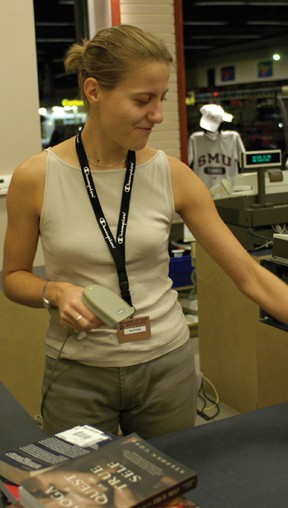
Tempting Texts
School started yesterday, and many students are already struggling-to pay for their textbooks. According to the Chronicle for Higher Education, the average college student dishes out $450 a year for textbooks. But while students spend hundreds, many professors are being paid thousands to use certain textbooks.
After interviewing top publishing executives, textbook sales representatives and professors nationwide, the Chronicle for Higher Education discovered deals between deans and publishers that were financially beneficial but ethically questionable.
Paying professors to review textbooks is nothing new in the industry, but some companies require teachers to use the book in their classes.
“To be blunt, you have to find a way to buy off the professor,” one sales representative at a large textbook company said in the Chronicle for Higher Education article.
Last January, thousands of history professors nationwide received a letter from North West Publishers offering them $4000 to review an introductory history textbook. The only stipulation was that the professor had to require his students to purchase the book. No textbooks published by North West were found during a browse through the history section of the SMU bookstore.
Jasper Neel, dean of Dedman College, said he was unaware if any SMU professors had received the letters from North West. He said being paid to adopt a certain textbook is inappropriate for any faculty member and completely different from a simple review. Neel has reviewed numerous books for money, which is common practice, he said. Textbook reviews take a great deal of time, and it would be nearly impossible to convince a professor to do it without a monetary supplement.
Neel said textbooks are normally chosen by professors at teaching conventions, where each publishers sets up displays of its new textbooks for teachers to browse through. It is also common for professors to receive a free copy of a textbook’s new edition from publishers in the mail. This gives teachers an opportunity to evaluate the textbook, and possibly choose to use it for their class. If the edition is better than the textbook they are currently using, professors will choose to adopt the new edition or a new textbook completely. Professors also judge the quality of a textbook by the reputation of the publishing company that distributes it, which is another possible reason why unknown North West uses cash to persuade teachers.
According to the Higher Education Chronicle article, Robin Hahnel, a professor of economics at American University, has also written many reviews of textbooks that his bank account can prove. He said he does not care whether or not the publishing companies even read the reviews and recognizes it’s a ploy to get him to adopt the book. But Hahnel eagerly jumped on the North West’s deal of a paid adoption.
“Do I support this kind of activity of the part of this company? No,” Hahnel said. “But it’s not an effective way for me to change the world by turning down these people.”
Some question how different North West’s approach is from a professor who chooses to use a textbook he wrote in his classroom.
Neel said professors should be allowed to use their own textbooks in their class, but they should donate the royalties made by those books back to the institution.








